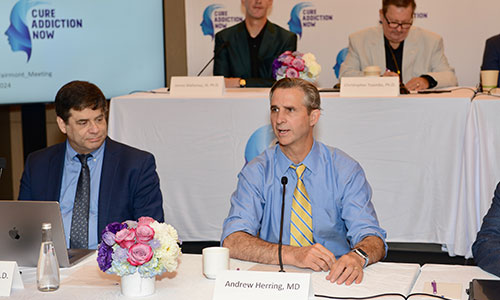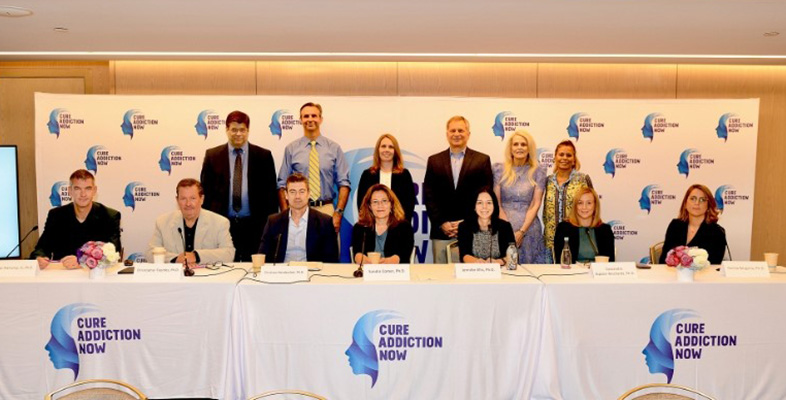Cure Addiction Now’s 2024 Fall Forum – Watch Now
On September 7, 2024, Cure Addiction Now (CAN) held its semi-annual Forum and Webinar bringing together prominent and leading scientists at the forefront of Substance Use Disorder (SUD) and mental health research. Hosted at the Fairmont Century Plaza in Los Angeles, California, the forum was a unique opportunity to learn about the latest advances to stop this devastating disease.
Cure Addiction Now Founder Nancy Davis opened the forum by sharing her deeply personal inspiration to launch our nonprofit organization dedicated to the understanding, treatment & ultimate cure of substance use disorder (SUD) by funding cutting-edge research, rooted in her late son Jason’s struggle with addiction. She emphasized the urgent need to address addiction with compassion, highlighting it as a disease, rather than a choice. Driven by a desire to honor Jason’s memory, Nancy’s commitment to advancing treatment reflects both the urgency of addressing addiction and the hope fueled by dedicated research and expert collaboration.
“The only thing as a parent that I can do in his memory is to do something that’s going to change the trajectory of this disease and start saving people’s lives and not making anybody ever feel ashamed or bad.”
-Nancy Davis, Co-Founder and President of Cure Addiction Now
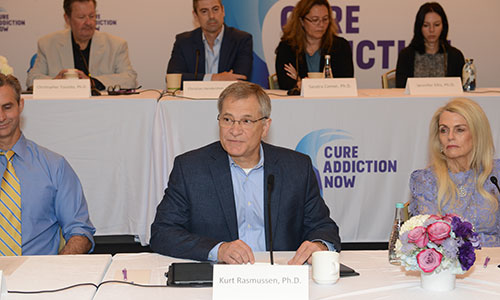
Dr. Kurt Rasmussen, Chief Scientific Officer of Delix Therapeutics and Chair of Cure Addiction Now’s Scientific Advisory Board, outlined the forum’s focus on the escalating overdose crisis and the development of new medications to combat addiction. He introduced patient advocate and actress Lisa Vidal, who shared her personal and tragic story of her son’s battle with substance use disorder. Lisa’s account highlighted the severe impact of addiction and the urgent need for effective solutions, underscoring the critical need for change in how addiction is addressed and the importance of supporting ongoing research and treatment advancements.
Dr. Andrew Herring, MD, an emergency physician and addiction specialist at Alameda Health System, shared his mission of ensuring that anyone in the country can access high-quality, evidence-based care for addiction in emergency rooms. Reflecting on the importance of leveraging scientific advancements to address the opioid crisis, he emphasized the urgent need for better tools and training for healthcare providers.
“My simple mission is that I think everyone in the country should be able to walk into their local emergency department and get high-quality care that leverages the knowledge and science of achievements of people like here that are sharing this panel.”
-Dr. Andrew Herring, Alameda Health System in Oakland, California
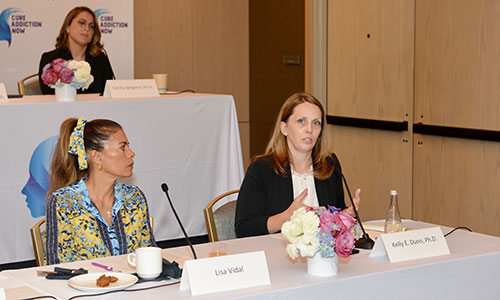
Dr. Kelly E. Dunn, PhD, Johns Hopkins School of Medicine, outlined the urgent need for innovative treatments for substance use disorders, particularly given the fentanyl crisis and the challenges of poly-drug use. She noted that while effective medications for opioid use disorder exist, FDA-approved treatments for cocaine are lacking. Dr. Jennifer Ellis, PhD, also from Johns Hopkins, detailed a pilot study funded by Cure Addiction Now, exploring the potential of Suvorexant, an FDA-approved insomnia medication, to assist those with co-occurring substance use disorders. The study aims to assess whether Suvorexant’s unique properties could offer a promising new treatment option.
Dr. James Mahoney, PhD, from the Rockefeller Neuroscience Institute discussed his work with focused ultrasound neuromodulation, a non-invasive technology aimed at treating substance use disorder by targeting the brain’s reward circuitry. He highlighted its potential to reduce cravings and improve treatment adherence, with preliminary results showing promising outcomes for individuals with severe addiction.
“We are all casualties of the war on drugs,” Dr. Adam Kaplin, PhD, and Chief Scientific and Chief Innovation Officer, Miralogx Inc, emphasized that we need to rethink our approach to substance use disorder. He criticized the current strategy for exacerbating stigma and criminalizing addiction rather than addressing its root causes. Kaplan pointed out the excessive government spending on enforcement and incarceration, suggesting that redirecting these funds toward treatment and rehabilitation could yield significant societal benefits, similar to Portugal’s successful decriminalization model.
“There shouldn’t be any more parents who have to bury their children ever. We have to stop brushing this under the rug and acting like it’s not important.”
-Nancy Davis, Co-Founder and President of Cure Addiction Now
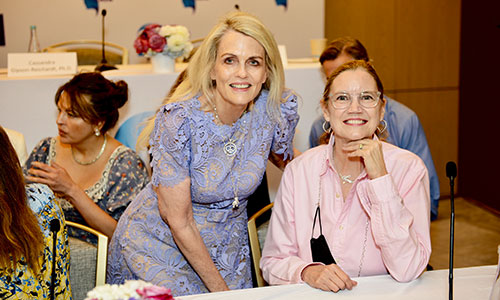
Kurt and Nancy concluded by highlighting the exceptional work of the team and the urgent need for additional support to advance their mission. Kurt emphasized the importance of donations to fund innovative research and leverage seed grants into larger ones, aiming to create a lasting impact on the treatment of substance use disorders. Nancy reflected on the profound loss experienced by families affected by addiction and emphasized the necessity of addressing this crisis with increased funding and attention.
To view the full discussions and insights shared during the forum, please watch the video linked below.
To support Cure Addiction Now’s efforts in advancing research and treatment, please consider making a donation here.
